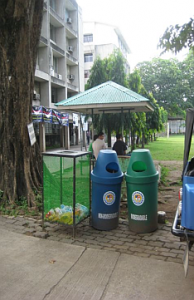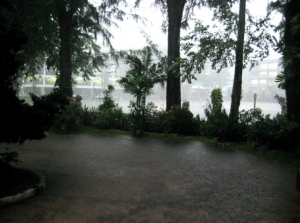Recently, Xavier University had its groundbreaking ceremony at Manresa for their new CIT (Center of Industrial Technology), which is considered to be an environmentally sound building. This eco-building would serve as the model for other such buildings in the Philippines.
Step by step, Xavier University is achieving its goal in becoming a green campus. It is maintaining and improving its Engineering and Resource Sanitation Centers and KKP outreach to address the concerns of waste management within and outside the campus. Recent discussions are focusing on strengthening ongoing activities.
Waste segregation process is underway involving five different moves:
- Leaf litter and other organic matter is collected and there are some large plastic drums around the central area where sweepers place some of their load; it all ends up back in the sorting area and transport to Manresa for composting.
- Waste food from canteen is sold off directly.
- A new open frame for PET bottles at the corner of the soccer field collects a good crop of easily recycled bottles and now suggested cans, have an open wire frame makes it visible so people do not throw other materials.
- The standard biodegradable and non-biodegradable separation involves paired drums with lids around the campus but certain things are being learned from this:
- Plastics and some styrofoam get thrown in either drum. What is inside is not visible and it does not seem to matter to the students.
- There is very little biodegradable material thrown in either bin.
- The question arises: Is it a good idea to have paired drums?
- This suggestion is being extended to Jollibee, McDonald’s,and other fast food chains orders coming from off campus that the company deliver in cardboard.
- There is also a focus to stop the use of styrofoam on campus and for all employees and students to have actual cups and containers.
- The suggestion on bio-waste coming from the comfort room baskets is not to incinerate it as it causes another environmental problem in burning.
-
The place for biodegradable bins is not yet clear. In the classroom, there is little paper waste and the teachers already have recycling bins for paper in the offices.
From this has come the proposal that by January 2011, the university would no longer allow cafeteria concessionaires to use any fine plastics and styrofoam products in packaging their food hence, have asked faculty, staff, and students to bring their own plastic container (B.Y.O.B. – bring your own baunan). This effort is becoming a popular move across Asian Universities so as not to add to the problem of soiled-plastic recycling. Connected to this is Xavier’s advocacy on environment called “clean as you go”, also known as CLAYGO. The CLAYGO is the green revolution initiative of the “Ateneos”.
The other main initiative is to start gathering baseline data on daily waste production, segregation to the different sources of recycling thus, zeroing into specific wastes that goes to the dumpsite. However, materials sorting facility is still in process.
The infiltration process (called biopori) that is used in ATMI-Solo (Indonesia) generates some interests in the university. Given that the campus playing field gets flooded during heavy rain, Xavier University would like to do adopt the bio-pori and perform some trials, initially in their football field.
For more information about biopori, (Click here).
This update is drawn out from the visit to Xavier University last 4th November 2010. During the visit, Engr. Joy Mabaylan, Ms. Rubelyn Valdehueza, Mr. Ramil Pajo, and Mr. Rey Mante provided the information about green campus initiatives of the university.








